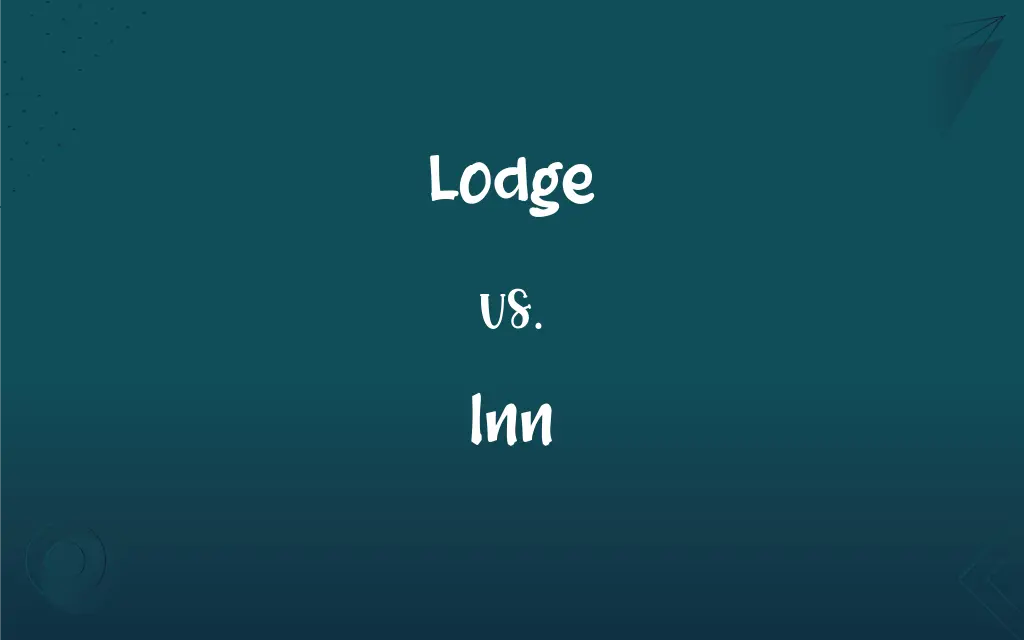Lodge vs. Inn: What's the Difference?
Edited by Aimie Carlson || By Janet White || Published on March 5, 2024
A lodge is typically a small, rustic dwelling in a remote or natural setting, often used for holidays or hunting, while an inn is a small hotel or guesthouse, usually offering meals and lodging.

Key Differences
The terms "lodge" and "inn" both refer to establishments offering temporary accommodations, but they differ in several aspects. A lodge is typically understood as a place of accommodation located in a more rural or wilderness setting, often catering to specific interests such as hunting, skiing, or hiking. In contrast, an inn is a more traditional term that refers to a smaller hotel-like establishment, often family-owned, providing both lodging and food, usually located in a town or along a highway.
Lodges often emphasize the experience of the natural or wilderness environment in which they are situated. They may offer specialized activities and amenities related to their location, like guided tours or outdoor equipment rentals. Inns, on the other hand, are known for their personal touch and historical charm. They may be housed in older buildings with unique architectural features and typically offer a cozy, home-like atmosphere.
The architecture and design of lodges often reflect their natural surroundings, using materials like wood and stone, and are designed to blend in with the landscape. This can make them attractive to those looking for a more rustic or outdoorsy experience. Inns, conversely, might be located in renovated houses or purpose-built facilities and are often decorated to create a warm and welcoming environment. They can range from basic accommodations to more luxurious settings, often characterized by their personalized service and local charm.
In terms of the services provided, lodges might focus more on the specific needs of outdoor enthusiasts or people looking to escape the hustle and bustle of city life. They might not always offer a full range of services like in-house dining, instead emphasizing the surrounding attractions. Inns are more likely to provide a range of services, including meals, often with a focus on local cuisine, and a more comprehensive hospitality experience that may include various guest services.
Both lodges and inns provide lodging facilities, a lodge is generally more focused on offering an experience connected with nature and outdoor activities, often in more remote or rural locations. An inn, meanwhile, is typically a quaint, comfortable establishment that offers lodging and meals, and is often family-run, focusing on providing a personal and homely experience to its guests.
ADVERTISEMENT
Comparison Chart
Location
Often in natural, remote areas
Located in both urban and rural settings
Purpose
Leisure, hunting, retreat
Accommodation for travelers
Size
Generally small and intimate
Can vary in size, usually small to medium
Facilities
Basic, focused on outdoor activities
More comprehensive, including dining
Atmosphere
Rustic, natural
Home-like, hospitable
ADVERTISEMENT
Lodge and Inn Definitions
Lodge
A lodge can also refer to a local branch or meeting place of certain fraternal organizations.
He was a member of the Masonic lodge.
Inn
Historically, an inn was a tavern or public house offering lodging to travelers.
The old inn was a popular stop for stagecoaches.
Lodge
To lodge also means to make a formal statement or complaint about something.
She lodged a complaint with the company's HR department.
Inn
An inn is a small hotel or guesthouse, offering lodging and meals.
They found a charming inn for their weekend getaway.
Lodge
A lodge is a small house or cabin in a remote area, especially one used for holidays or hunting.
They stayed in a mountain lodge during their ski trip.
Inn
An inn sometimes refers to a small, cozy establishment with a personal touch.
The family-run inn had a homey feel.
Lodge
In historical terms, a lodge is a small, temporary shelter or hut for a guard or worker.
The gatekeeper lived in a small lodge by the entrance.
Inn
In literary contexts, an inn often symbolizes rest or a meeting place.
The travelers shared stories at the inn.
Lodge
A lodge can be a verb meaning to provide someone with temporary accommodation.
The village lodged the hikers during the storm.
Inn
An inn can be a place of warmth and hospitality, emphasizing comfort.
The inn's warm fire was inviting after a long day.
Lodge
An often rustic building used as a temporary abode or shelter
A ski lodge.
Inn
A public lodging house serving food and drink to travelers; a hotel.
Lodge
A small house on the grounds of an estate or a park, used by a caretaker or gatekeeper.
Inn
A tavern or restaurant.
FAQs
What services do inns provide?
Inns offer lodging and often meals and other basic guest services.
Can lodges be found in urban areas?
Lodges are typically in rural or natural settings, not urban areas.
Are lodges expensive?
Lodge prices vary, some are luxury accommodations, others are more affordable.
What is a lodge?
A lodge is a small, rustic building in a natural setting, often for leisure activities.
Are inns suitable for long stays?
Yes, inns can accommodate both short and long stays.
What makes a lodge unique?
Lodges offer a unique, nature-oriented experience, often with specific outdoor activities.
Can lodges accommodate large groups?
Some lodges can, but they're generally better suited for smaller groups or families.
How do inns differ from hotels?
Inns are generally smaller and offer a more personal, homely atmosphere than hotels.
What is the typical size of a lodge?
Lodges are usually small to medium in size, offering an intimate setting.
Are lodges a good choice for romantic getaways?
Many lodges offer a cozy, intimate setting ideal for romantic trips.
Do inns provide room service?
Room service availability varies; some inns offer it, while others do not.
Do lodges offer food services?
Some lodges offer meals, but it varies by location and type.
Are inns family-friendly?
Many inns are family-friendly, but it's best to check specific policies.
Is it common for inns to have a historical background?
Yes, many inns have historical significance and charm.
Are pets allowed in inns?
Pet policies vary; some inns allow pets, while others do not.
Do inns usually have on-site restaurants?
Many inns have restaurants, but not all.
Is Wi-Fi available in lodges?
Wi-Fi availability varies; some lodges offer it, while others promote a tech-free environment.
Do lodges provide modern amenities?
This varies; some lodges offer modern comforts, while others focus on a rustic experience.
What activities are typically available at lodges?
Activities like hiking, fishing, skiing, and wildlife viewing are common at lodges.
Can inns be found in remote locations?
While inns are more common in accessible areas, some can be found in secluded locations.
About Author
Written by
Janet WhiteJanet White has been an esteemed writer and blogger for Difference Wiki. Holding a Master's degree in Science and Medical Journalism from the prestigious Boston University, she has consistently demonstrated her expertise and passion for her field. When she's not immersed in her work, Janet relishes her time exercising, delving into a good book, and cherishing moments with friends and family.
Edited by
Aimie CarlsonAimie Carlson, holding a master's degree in English literature, is a fervent English language enthusiast. She lends her writing talents to Difference Wiki, a prominent website that specializes in comparisons, offering readers insightful analyses that both captivate and inform.






































































